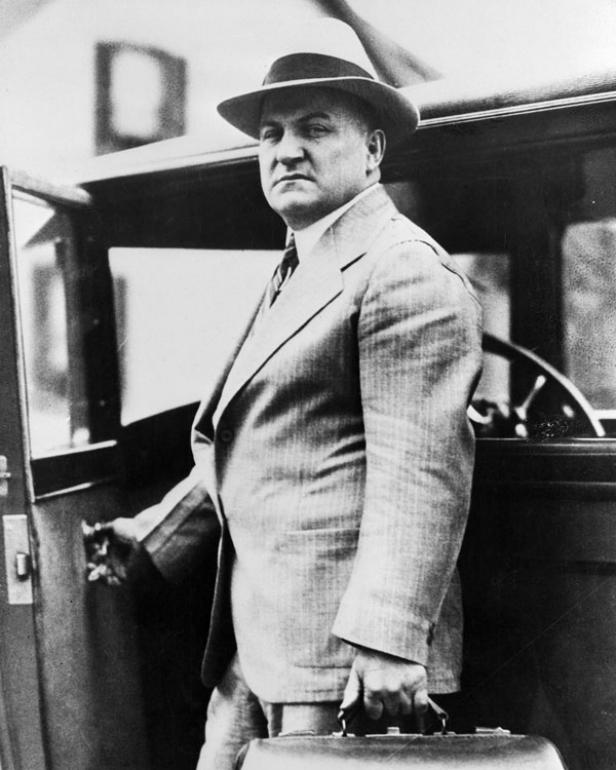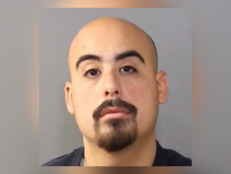Author Karen Abbott Reveals Why She Finds Solace In True Crime
Go behind the scenes with ID Book Club author of The Ghosts of Eden Park to learn how Abbott discovered an inspirational woman who bossed J. Edgar Hoover around, some of the bizarre habits of George Remus, the real life "King of Bootleggers" and more.

Have you always been interested in true crime? Why did you decide to write a book based on crime?
I’ve been interested in true crime for as long as I can remember. When I was a kid my favorite show was Unsolved Mysteries, hosted by Robert Stack. I was so mesmerized by Stack’s hypnotic gaze and weighty baritone that I wanted to be him (and actually once was, for Halloween in 1989). I also submitted crime stories to Ellery Queen and Alfred Hitchcock mystery magazines, which always seemed to feature a murderous matron, skilled at disguises and revenge. (They were never published, of course, and now I wonder why my mother didn’t send me to therapy!) In my stories the women were always more dangerous than the men, which was probably a self-protective instinct; it allowed me to indulge my love of danger—all of the vast and horrible ways I could be undone by the world—while also providing an illusion of control.
Also, in some strange way, I find true crime to be a solace. When the world takes an unsettling turn, my instinct is to seek not optimism and light, but to venture further into the darkness. There is a comfort in finding and dissecting the worst of humanity; if we can understand our wicked instincts, they lose their power.
All four of my books have featured crimes, including numerous murders. I don’t think I’d be drawn to tell a story that doesn’t leave a few bodies in its wake.

Karen Abbott [photo by Gilbert King]
What was the inspiration behind your book?
I usually get my ideas by perusing old archives and out-of-print books, but this one came through television—specifically the show “Boardwalk Empire,” which aired on HBO for five seasons. It was brilliant, and it perfectly captured the dawn of the 1920s—that time when bootleggers were just beginning to plot ways to circumvent the Volstead Act, and no one had yet heard of Al Capone.
There was a minor character named George Remus. He spoke of himself in the third person (in one episode, there’s a hilarious Abbott and Costello-esque exchange between him and a very confused Capone) and stole every scene he was in. I wondered if Remus was a real person, and indeed he was! His real story was much more dramatic than the show’s portrayal, with a sordid love triangle, a devastating betrayal, a murder, and a sensational trial.

Bettmann
(Original Caption) Cincinnati, Ohio: "King of bootleggers," George Remus, after serving two years at Atlanta Federal Penitentiary, arrives back home in Cincinnati [Getty/Bettmann]
The real Remus also spoke of himself in the third person: “Remus was in the whiskey business,” he’d say, “and Remus was the biggest man in the business. Cincinnati was the American mecca for good liquor, and America had to come to Remus to get it.” Other sayings include: “This is going to be a hell of a Christmas for Remus”; “Remus has been betrayed by everyone he had trusted”; and my favorite: “Remus’s brain exploded.” (You’ll have to read the book to decide for yourself if a brain explosion actually occurred.) In all my years of researching history, I have never come across a more interesting, bizarre, and brazenly outlandish character. He was an impoverished, abused German immigrant kid who, through determination and savvy, became the most successful bootlegger in American history. Within a year, he owned 35 percent of all the liquor in the United States—an astonishing figure. Newspapers at the time compared him to Vanderbilt and Rockefeller.
What is your writing process like? Do you gather all your research/plot lines first and write an outline before putting pen to paper, or do you dive right in?
Good question! The short answer is that I research as I write, and the long answer involves how I learned to do that the hard way…
When I was working on my first book, Sin in the Second City, I fell into what I call “The Rabbit Hole of Research”—you become so immersed in a particular topic that you lose track of everything else for days, weeks, even months. Since my book focused on a lavish Chicago brothel in the early 1900s, I decided I should research turn-of-the-century contraceptives. Well, I fell down this particular rabbit hole for about a month, and wrote a few paragraphs about the topic in the book—only to have my editor whittle it down to a sentence or two. Meanwhile, I’d wasted all of that time and jeopardized my chance of making my deadline.
So from then on I decided to outline in advance, and do any significant research while I draft so I can stay within the confines of the story I want to tell. For The Ghosts of Eden Park, I was really fortunate to have found a 5,500 page trial transcript during my research. It was full of incredible details about the bootlegger George Remus and his staggering empire; for example, at the height of his operation, he owned 35 percent of all of the alcohol in the United States. There were also great details about Remus’s extravagant party favors: diamond stickpins for the men; a $1000 bill tucked under everyone’s plate; and, for every women attendee, a brand new 1922 car. Not surprisingly, Remus was one of F. Scott Fitzgerald’s inspirations in his creation of Jay Gatsby.
There were also great details about Remus’s extravagant party favors: diamond stickpins for the men; a $1000 bill tucked under everyone’s plate; and, for every women attendee, a brand new 1922 car. Not surprisingly, Remus was one of F. Scott Fitzgerald’s inspirations in his creation of Jay Gatsby.
But by far the strangest detail I found in the transcript: George Remus did not wear underwear. Apparently in the 1920s an aversion to underwear was cause for great alarm—it was potentially the sign of an unsound mind…
It took me four months to go through that transcript page by page, and the resulting outline was 85,000 words—nearly as long as the book itself.
Who is your favorite character in your book? Why?
One of the most interesting and complicated characters in The Ghosts of Eden Park is Mabel Walker Willebrandt. In 1921, when President Warren Harding appointed Willebrandt to be the assistant attorney general of the United States, she was 32 years old, only five years out of law school, and had never prosecuted a single case in her career—and yet suddenly she was in charge of overseeing all Prohibition-related prosecutions in the United States. Her crooked bosses at the Department of Justice and the White House clearly thought her inexperience and youth would be a detriment, but she surprised everyone by kicking ass.

In addition to the overt and pervasive sexism she experienced, Willebrandt had to grapple with a tremendous physical challenge: She was almost entirely deaf. Because she didn’t want her male colleagues to know of this handicap, she spent an hour each morning styling her hair to conceal her hearing aids. She never spoke of her deafness in public, but sent these incredibly raw and poignant letters to her parents:
“The dread shadow of deafness all but submerges me. For Mama and Papa, dear, when from every quarter and indirectly… I hear the most extravagant marvelings at my capacities over the way I handle myself before the court, and when presiding over trying conferences, that surge of bitterness rises even at their praise when I think, ‘Damn you, you think that’s good, do you know what then I could do if I weren’t struggling under the most horrible handicap that you do not guess.”
One more thing that underscores Willebrandt’s absolute badassery: She bossed around J. Edgar Hoover, who was just at the beginning of his career. I love the idea of a woman telling him what to do.
Do you think the events of The Ghosts of Eden Park could happen today, or is there something unique about the Jazz Age that allowed them to occur?
I think George Remus perfectly embodies the spirit of the 1920s: scheming, quick-talking, fast-acting, risk-taking, drawn to excess. As Fitzgerald wrote, Gatsby “sprang from his Platonic conception of himself,” inventing a persona for a world he wished to inhabit, even if he never truly belonged. I think that line could apply equally to Remus. He was someone who reinvented himself to fit his own ideal, and the Roaring 20s were a grand time of reinvention.
The country had just emerged from WWI. The war swept away a lot of gender norms because women left home in large numbers and flooded the workplace, and America found itself in this sort of in-between period. People were more hedonistic after realizing that life can be so short, and the Depression had yet to put a damper on everything. When else but the 1920s could a prisoner have a multi-room suite, with his own personal chef and stash of liquor? And I don’t want to give any spoilers, but the nature of the trial, and the ultimate verdict, could not have happened in any other era.
Is there a recent case/person that you are particularly interested in? Why?
For a few years I’ve been obsessed with the tragic case of Elisa Lam. She was a Canadian college student who took a solo trip in the winter of 2013, ending up in Los Angeles. She stayed at the Cecil Hotel, which has a disturbing past: serial killers have called it home; guests have been murdered in the rooms; and several people committed suicide by leaping off its roof.
Lam disappeared on January 31 of that year. A few weeks later, guests began complaining about the water; it came out black and tasted strange. When the maintenance team investigated, they found Lam’s decomposing body in a water tank. And then came the discovery of a bizarre elevator surveillance video showing Lam on her final night. She waves her arm and hops in and out of the carriage and appears to be communicating with something unseen. Those few moments caught on tape still haunt my dreams.
What is your favorite ID show?
I’m a big fan of Disappeared, and was particularly enthralled by the episode “A Bridge Too Far,” about the strange disappearance of Richard Petrone and Danielle Imbo. I’m from Philadelphia and knew all of the locations mentioned in the episode, and I could imagine how the city looked the night that they—and their truck—vanished without a trace.
CLICK HERE TO ORDER THE GHOSTS OF EDEN PARK









